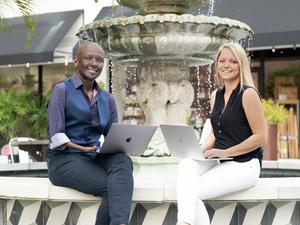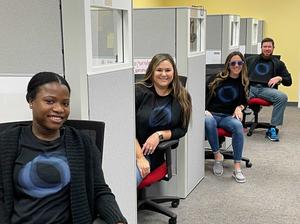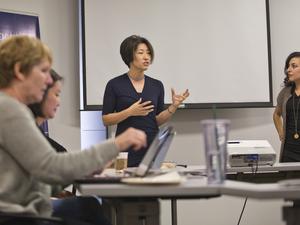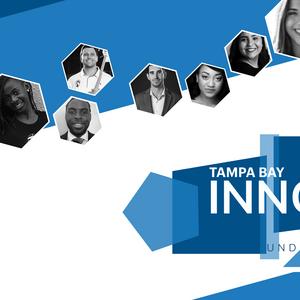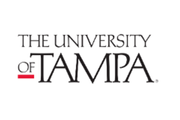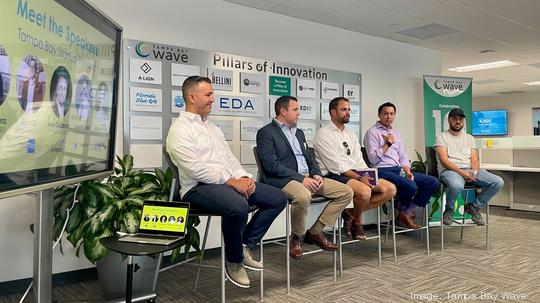
Tampa Bay has continued to rack up wins over the years with new transplants, new technology and, of course, splashy exits.
Some of the founders behind the big sales gathered on Wednesday afternoon at the Tampa Bay Wave’s new headquarters to chat about lessons learned, the hardest decisions they had to make and how they got by with a little help from their friends. We’ve got the key takeaways below.
On what they look for in a co-founder
“You’re picking a life partner as much as you’re picking a business partner,” Gerwai Todd said. Todd was an executive at ConnectWise, which was acquired in 2019. He is now the co-founder of software company TimeZest. “You need to interrogate the process and run it the right way. There’s a lot on the line — bank accounts, products you’re building. Your business partner has to be like a life partner.”
“The most successful partners are usually two,” said Ben Goldman, co-founder of 180byTWO. The company was acquired in 2020. “We had three; not to say it didn’t work, but one of the reasons we ended up selling was we couldn’t all agree. In some cases, three is a crowd.”
The first step entrepreneurs should take to be successful
“Figure out pain points that aren’t being addressed,” said Dean Collura, co-founder of marketing tech firm TitleTap. “And second, think of the exit in the beginning. Because they ask about everything, and it’s like, ‘Well, that was nine years ago. I don’t have that paperwork now.’”
“Just recording yourself, having a self-document,” Eliot Smith, co-founder of TitleTap, added. “And anything repeatable, just do it once or twice with a video or document, put it on the side and hand it off. So you’re not repeating the same thing every time.”
On funding
“There’s a disproportionate time spent on funding,” Goldman said. The company was acquired in 2020. “I think founders are lured into, ‘Let’s get funding, then I’ll be legit.’ Maybe when you exit, you do that, but finding the problem, making money yourself, should be a priority. Then the funding will come.”
“We’ve bootstrapped our business, too, and our time at ConnectWise was an experience of bootstrapping,” Todd said. “But certain business models require you to get funding. We’re fortunate with software; if someone puts in sweat equity, we can go a long way without funding. So my recommendation is to delay it as much as possible.”
“We had the MVP (minimal viable product) proving out the concept, but we wanted to raise immediately,” said Aaron White, co-founder of Script, which was acquired in 2021. “I had a wife; we had bills. With entrepreneurs, we’re good risk takers, not risk mitigators. But mitigating allowed me to be full-time for the business.”
On the one business decision they still remember
“The people you may have started with may not be the people to get you to the next phase,” Todd said. “That’s the hardest for me.”
“I remember the day; the company was in the early stages, and I almost abandoned the process,” Collura said. “But it was a decision of, ‘We just haven’t talked to enough people. Let’s get enough people until we get it right.’ And that was a turning point because the next call, we got our first check.”
“The people you hire can suck a lot of time, and time is the most valuable possession you have,” Goldman said. “If you train them and find out you don’t need them anymore ... I wouldn’t say it’s regret, but it’s looking at how to hire, who to hire.”
On remembering why they’re doing this
“Be careful; you only have so much time to give,” Collura said. “Find the balance: keep healthy, exercise. These are all real things where you go into tunnel vision; then it’s been three months. So remind yourself you’re not an island — because this is not designed to be done by yourself.”
“Be intentional with making time with others in your life who have gone through it,” White said. “Having a group you can meet with, be open and honest with, and have a Friend-D-A (versus NDA), is very helpful. Just to make sure, ‘This isn’t abnormal. This is OK, and here’s how we get through it.’”
“It shouldn’t be hard; more times than not, it should be fun,” Todd said. “You talk about how to work through stuff, but when you get product market fit, there will be a feeling of ease. You have to be careful of your mental state, so grind as long as you can, but know when to quit.”
“Having multiple life events occur as you’re building brings you down to your knees,” Goldman said. “But the business is going well; it’s just sometimes hard. My philosophy was to wake up and do it every day. Inevitably it will be worth it, but it should be a little hard; otherwise, everyone would be doing it.”
